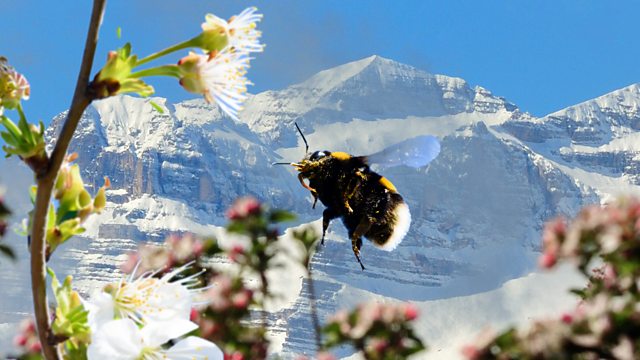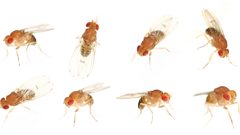How high can insects fly?
From insect superhighways way above our heads to bumblebees hanging out in the highest mountains and even flies in space, just how high can insects go?
If you took a fly into a really tall elevator and let it out at the top, would it still be able to fly? And what’s the absolute highest an insect could possibly go? It’s a question that’s been bugging CrowdScience listener Chee for a while, but presenter Alex Lathbridge is on the case.
He discovers that when they’re not buzzing around your lunch, insects can be routinely found flying high up in the atmosphere travelling from A to B. There are also ground-dwelling bumblebees living in the mountains of Sichuan, China that have demonstrated an ability to fly at altitudes higher than the highest point on the planet.
But leaving aside how high insects DO fly, how high COULD they fly if given the chance? Alex explores the theoretical limits of insect flight with the help of a bit of biomechanics – before contemplating the ultimate heights of the International Space Station where the mystery of whether a fruit fly will fly in zero gravity is finally answered.
Contributors:
Jason Chapman, University of Exeter
InΓ©s Dawson, science youtuber and expert in insect flight biomechanics
Michael Dillon, University of Wyoming
Wes Shaw, Head Gardener, Sky Garden
Sharmila Bhattacharya, NASA
Presented by Alex Lathbridge
Produced by Ben Motley for the Βι¶ΉΤΌΕΔ World Service
[Photop credit: Getty Images]
Last on
More episodes
Previous
Next
Clip
-
![]()
Can Insects Fly In Space?
Duration: 03:26
Broadcasts
- Sat 5 Mar 2022 00:32GMTΒι¶ΉΤΌΕΔ World Service
- Sat 5 Mar 2022 02:32GMTΒι¶ΉΤΌΕΔ World Service Europe and the Middle East
- Sun 6 Mar 2022 02:32GMTΒι¶ΉΤΌΕΔ World Service East and Southern Africa & West and Central Africa only
- Sun 6 Mar 2022 05:32GMTΒι¶ΉΤΌΕΔ World Service Australasia
- Mon 7 Mar 2022 09:32GMTΒι¶ΉΤΌΕΔ World Service
- Mon 7 Mar 2022 13:32GMTΒι¶ΉΤΌΕΔ World Service except East and Southern Africa, East Asia, South Asia & West and Central Africa
Podcast
-
![]()
CrowdScience
Answering your questions about life, Earth and the universe



